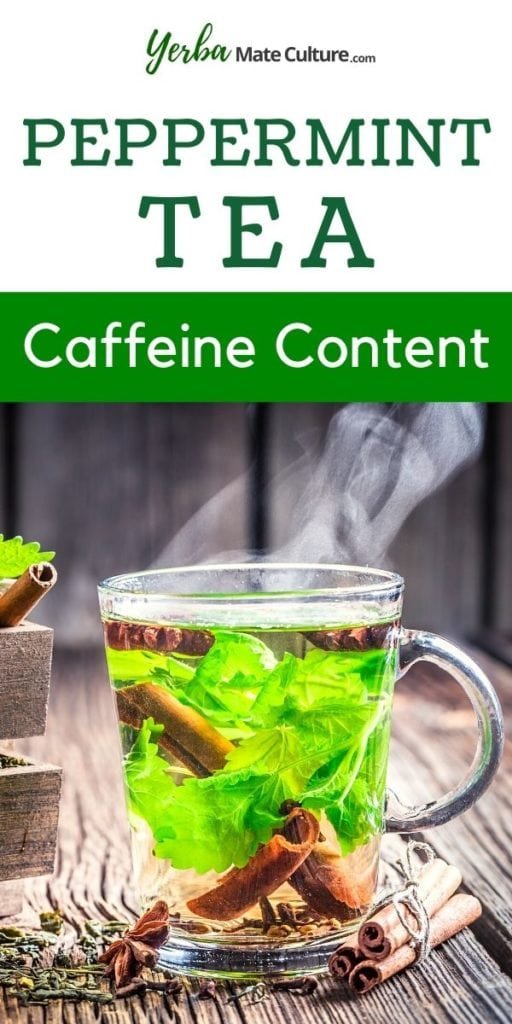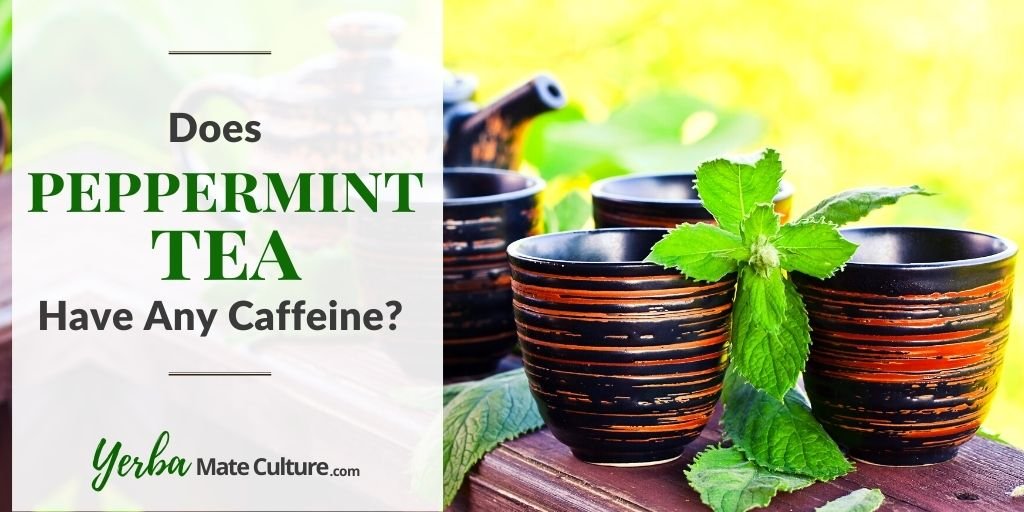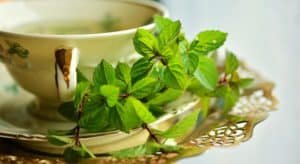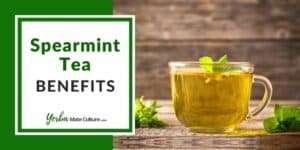Peppermint tea is definitely one of my favorite drinks. It’s healthy, refreshing, and tastes great both hot and iced.
So how could you not love it!
But can you sip it late in the evening, or is going to ruin your sleep?
Pure peppermint tea doesn’t have any caffeine so you can have it any time of the day without worries. But if you need an energy boost, you can mix it with other ingredients to add caffeine to your drink.
Read this guide to find out more about peppermint tea caffeine content. I will also explain some basic facts about this interesting herb and tell you how to make a cup of caffeine-free mint tea or prepare an uplifting caffeinated blend.
Peppermint Tea Facts
A cross between spearmint and watermint, this hybrid mint is indigenous to Europe and the Middle East and is now cultivated all over the world.
Peppermint has a high menthol content giving it a cooling and fresh taste and aroma.
However, you don’t always have to make your mint tea with peppermint.
Here are two more interesting alternatives:
- Spearmint contains less menthol and a sweeter and more delicate taste. Often used as a culinary herb it also has compounds that may boost cognitive health and working memory.
- Wild mint is a less known variety that has a more bitter and “minty” taste compared to peppermint.
Below is an infographic with a summary of these different mint teas:
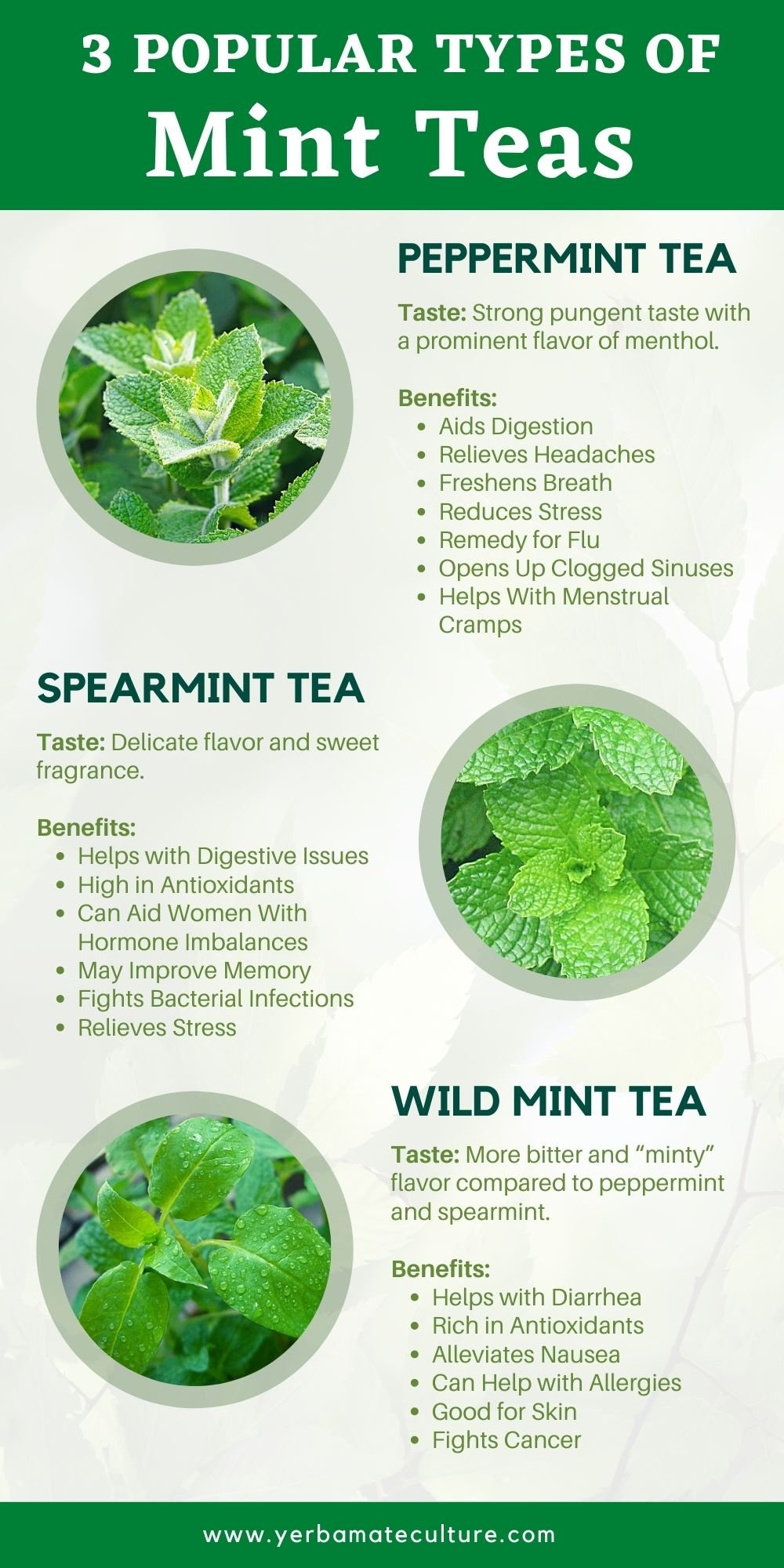
Benefits and Uses
Peppermint is one of the most commonly used ingredients in traditional herbal medicines. Indian Ayurvedic medicine describes it as a cooling herb that is good for respiratory health and improves digestion.
Here are some benefits of peppermint tea that are backed by research:
Good for Digestion: May relieve digestive issues by promoting bile production and gas movement.
Aids with Stress and Headaches: The muscle-relaxing and pain-relieving compounds in peppermint can help with relaxation and treating tension-type headaches.
Remedy for Flu and Common Cold: Opens up airways and has antibacterial and anti-inflammatory properties that boost the immune system.
Natural Breath Freshener: Peppermint is a common ingredient in toothpastes as it has a fresh scent. It may also prevent plaque and caries by inhibiting the growth of harmful bacteria.
How to Make Peppermint Herbal Tea
As mentioned earlier, pure peppermint tea is caffeine-free so you can drink it late in the evening without ruining your sleep.
Here is how to make it:
- Boil fresh water.
- Put some fresh or dried peppermint leaves into a teapot. You can use about two teaspoons of dried peppermint (or two tablespoons of fresh leaves) per cup of water.
- Add the hot water into the teapot and cover.
- Steep for about 5 to 10 minutes. The longer you steep the stronger the tea will be.
- Strain into cups and enjoy!
Additional tips:
- If you have a sore throat, add some ginger and honey to the tea.
- Peppermint is also a nice ingredient for iced tea. Check out these herbal iced tea recipes for some ideas.
- Grow your own peppermint indoors or in your backyard or balcony. It’s easy and you can also use it in salads, marinades, and desserts.
Read my guide with the best peppermint tea brands to find pure mint tea and delicious ready-made blends.
When Does Peppermint Tea Have Caffeine?
Mint is often blended with other ingredients to make a more complex and satisfying brew.
It’s also popular to mix peppermint with black or green tea to make a caffeinated blend that will give you an energy boost.
There are also other options that have caffeine including:
- Yerba Mate
- Oolong Tea
- White Tea
- Pu-erh Tea
Most herbal teas don’t contain caffeine, so you can use them together with peppermint for a relaxing evening cup. One of my favorite bedtime teas is peppermint mixed with chamomile and licorice root.
Caffeine Content of Different Mint Teas
Sometimes you need caffeine to keep you going through the activities of a busy day.
But how much caffeine do different mint tea blends have?
Let’s take a closer look at some energizing options and how to make them.
The caffeine content of different mint tea blends:
Yerba Mate & Mint – about 80 mg caffeine/cup: Use two teaspoons of yerba mate tea with dried or fresh peppermint leaves and brew for about 5 minutes. This will make a refreshing and uplifting cup of herbal tea!
Assam Black Tea & Mint – about 60 mg caffeine/cup: Assam tea has more caffeine than other black teas so it’s a great option to boost your energy levels. Mix one or two teaspoons (or one tea bag) of Assam tea with the mint and brew for about 3 minutes.
White or Green Tea & Mint – about 25 mg caffeine/cup: If you only want a little bit of caffeine you can add one to two teaspoons of white or green tea with the mint. Brew with water that is about 180 degrees Fahrenheit (or 80 Celsius) to avoid a bitter taste.
Now you have plenty of options to try whenever you are craving for a refreshing cup of mint tea.
And while regular iced tea contains caffeine, you can make a great caffeine-free version with mint leaves, honey, and lemon.
Have fun and experiment with peppermint and other mints to find your favorite ingredients!
Peppermint Tea and Caffeine FAQ
Is peppermint tea caffeine-free?
Yes, pure peppermint tea is naturally free of caffeine. Also, most herbal blends that contain peppermint don’t have any caffeine.
However, there are popular options, like peppermint green tea, that have caffeine.
Is peppermint tea good for sleep?
Pure peppermint tea is an excellent bedtime drink since it has a relaxing effect and contains no caffeine. Mix it with other ingredients such as chamomile to improve your sleep quality.
How to make peppermint tea with caffeine?
If you want to make an energizing cup of peppermint tea, simply mix it with something that has caffeine. Some great options are black tea, green tea, and yerba mate tea.
You can also look for ready-made mint tea blends that have caffeine.
Save on Pinterest:
